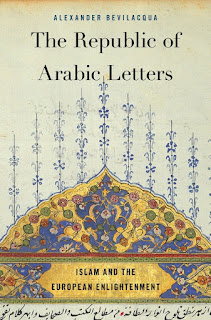The Republic of Arabic Letters
Episode 348
hosted by Maryam Patton and Shireen Hamza
Feed | iTunes | GooglePlay | SoundCloud
When and how did European scholars first begin to seriously study Islam and the Arabic language? It has often been assumed that Medieval misconceptions and polemic towards Muslims were not cast off until the secularism of the European Enlightenment. In this episode, we learn that the foundations of the modern Western understanding were actually laid as early as the 17th century. Alexander Bevilacqua shares his research on the network of Catholic and Protestant scholars he calls the “Republic of Arabic Letters.” These scholars went to great lengths to learn Arabic and gather Arabic books and manuscripts, and eventually produced careful translations of the Qur’an and histories of Muslim societies based on Arabic sources.
Stream via SoundCloud
Contributor Bios
 |
Alexander Bevilacqua is assistant professor of history at Williams College, where he teaches the history of early modern Europe. He is interested in the cultural and intellectual transformations of what is often considered the first global era. |
 |
Maryam Patton is a second year PhD student at Harvard University in the joint History and Middle Eastern Studies program. She is interested in early modern cultural exchanges, and her dissertation studies cultures of time and temporal consciousness in the Eastern Mediterranean during the 15th and 16th centuries. |
 |
Shireen Hamza is a doctoral student in the History of Science department at Harvard University. Her research focuses broadly on the history of science and medicine in the Islamicate Middle Ages, especially in the Indian Ocean World. |
Credits
Episode No. 348
Release Date: 23 February 2018
Recording Location: Harvard University
Audio editing by Maryam Patton
Music: From archive.org - Baglamamin Dugumu - Necmiye Ararat and Muzaffer, and special thanks to Grandelavoix for permission to use their track Adonay.
Images and bibliography courtesy of Alexander Bevilacqua
Release Date: 23 February 2018
Recording Location: Harvard University
Audio editing by Maryam Patton
Music: From archive.org - Baglamamin Dugumu - Necmiye Ararat and Muzaffer, and special thanks to Grandelavoix for permission to use their track Adonay.
Images and bibliography courtesy of Alexander Bevilacqua
Select Bibliography
At Literary Hub, read an excerpt from The Republic of Arabic Letters on eighteenth-century European attempts to bring home Arabic, Persian, and Turkish manuscripts for Continental libraries.
 |
Burman, Thomas E. Reading the Qur’an in Latin Christendom, 1140–1560. Philadelphia, 2007.
Ghobrial, Jean-Paul. The Whispers of Cities: Information Flows in Istanbul, London, and Paris in the Age of William Trumbull. Oxford, 2013.
Hamilton, Alastair, Maurits H. van den Boogert, and Bart Westerweel, eds. The Republic of Letters and the Levant. Leiden, 2005.
Hamilton, Alastair, and Francis Richard. André du Ryer and Oriental Studies in Seventeenth-Century France. Oxford, 2004.
Loop, Jan. Johann Heinrich Hottinger: Arabic and Islamic Studies in the Seventeenth Century. Oxford, 2013.
Meserve, Margaret. Empires of Islam in Renaissance Historical Thought. Cambridge, Mass., 2008.
Southern, R. W. Western Views of Islam in the Middle Ages. Cambridge, Mass., 1962.
Stroumsa, Guy G. A New Science: The Discovery of Religion in the Age of Reason. Cambridge, Mass., 2010.
Tommasino, Pier Mattia. The Venetian Qur’an: A Renaissance Companion to Islam. Philadelphia, 2018.
Toomer, G. J. Eastern Wisedome and Learning: The Study of Arabic in Seventeenth-Century England. Oxford, 1995.











Comments
Post a Comment
Due to an overwhelming amount of spam, we no longer read comments submitted to the blog.